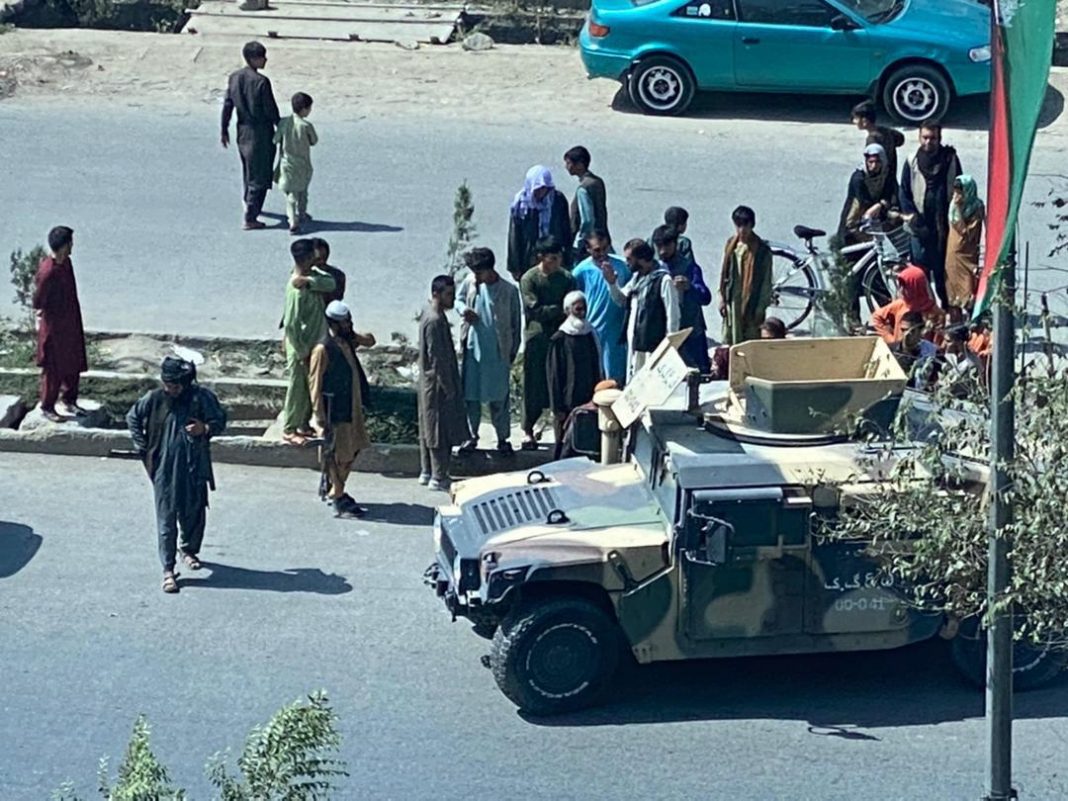Afghan photo journalist documents life outside of her window – the Taliban stopping people in the … [+]
M.A.
A group of Afghan women activists staged the third protest against Taliban-controlled Kabul in the past week to call for equal rights and full participation in political life. Demonstrations quickly turned violent.
In graphic footage shared by Afghanistan’s 24 hour news channel TOLO, head to head collisions took place. “The women who took part in the demonstrations were beaten and tortured by the Taliban”, says a source within the government of Afghanistan directly to Forbes. Taliban fighters using whips against Afghan women protesting the all-male interim government.
M.A., a photojournalist from Kabul, like many women, has locked herself at home since the Taliban took the capital. “I may be in danger just because of who I am,” she said. “If you, as a woman, take photos, it’s forbidden.”
A woman who was beaten in the streets of Kabul by the Taliban
M.A.
From her window she has been documenting life as she always has. Capturing the almost overnight shift of how life is in Taliban-occupied Kabul.
Forbes is identifying M.A. by her initials for her safety.
She recounts how she was speaking with fellow female colleagues who have worked, received college education and started businesses over the past 20 years since the Taliban regime was forced to stop. “My friend had so many thoughts and worries because she says she will have no future now, she will lose everything she’s created because she knows what the Taliban do,” says M.A.
The fears of the Taliban are not unfounded, they are based on the memory of brutality and violence of their past reign. “This fear is based on our experience with the Taliban years ago. We know who they are, and in Kabul, they are no different than they were 20 years ago, but now, we don’t know what they are capable of.”
In a surreal display of power, last August the longtime Taliban spokesperson, Zabiullah Mujahid, said at a press conference that women’s rights will be protected within Islamic Sharia law, “There will be no violence against women, no discrimination against women. Of course based on the frame of Islamic law.”
Days after the Taliban took Kabul, women began to dress in the most conservative dress, the Burka … [+]
M.A.
But the reality on the ground is that there are so many striking similarities of the Taliban we see emerging today with the hardline ruling one of the past. A regime that denied basic rights to women, forcing them to cover their entire bodies, banning women from work, and blocking most education for girls. On Tuesday, an all-male interim government for Afghanistan was made public, filled with members of the old guard that ruled during the 1990s.
Since the takeover, signs of a rapidly changing Kabul began, the Taliban painted over poster images of women outside of beauty shops. A nod to the Taliban’s modus operandi of the 90s and early 2000s. Mujahid also advised women to temporarily stay home because the Taliban soldiers are “not trained to respect them”.
“I spent 20 years investing in myself and my education and career and now I can see I won’t have anything. Tomorrow I may not be able to work, or go out and people are afraid of this,” says M.A.
Sakineh Amiri, a reporter for the Afghan daily Ettela’at al-Rooz, interviewed Taliban members on Kabul’s Red Bridge, who called her way of dressing “un-Islamic”, she wrote about the conversation on Facebook. “Women and girls today need to overcome their fears and return to work and empower schoolgirls. Women should not implement and legitimize the Taliban’s isolationist laws,” she said. Amiri has called on women to fight for their position in society: “Please break the fear, stand up for your human status and demand your basic rights so that society can prosper!”
Many Afghans waited at the airport hoping to escape the country
M.A.
This moment for the women and the country of Afghanistan is presenting itself as a defining one. Many fear what is to come, but other women are deciding to fight back, protesting in the streets and choosing to stay in their country. Mahbouba Sera, a prominent activist and head of the Afghan’s Women Network says she is panning to stay “for as long as I am needed in Afghanistan. As long as there is something that I can do which is useful. Afghanistan has 35 million people, and there are 18 million women, and there are a lot of people that are educated here we all need to work together. And that’s what I’m hoping happens, and it better happen sooner because the more time we spend in this kind of a quagmire, of not knowing what is going to happen, Afghanistan will be in deep danger,” says Sera in an interview with CNN.
“Last night it was about 11pm and the military cars were passing through my window. I don’t know how many they were. I saw so many cars military cars passing my window. I had no idea what they were going to do, it was scary,” says M.A.




